Body recomposition, the process of simultaneously losing fat and gaining muscle, is a transformative journey that requires patience and dedication. Most people can expect to lose fat and gain muscle at a rate of about 1-2 pounds per week during this period. Your starting body composition significantly influences the timeline, with those having a higher initial body fat percentage potentially seeing faster initial progress. Successful body recomposition involves a high-protein diet, resistance training, and calorie cycling, making it an effective approach for those aiming to improve their physique and overall health. Gaspari Nutrition offers science-backed supplements to support this process, which typically takes 12-16 weeks to see noticeable changes in body composition.
How Long Does Body Recomposition Take: Overview
- Body recomposition typically takes 12-16 weeks, with noticeable changes in fat loss and muscle gain at 1-2 pounds per week.
- Success depends on a high-protein diet, resistance training, and calorie cycling, with individual results varying based on starting body composition and adherence.
- Tracking progress through methods like 3D body scanning, BIA, progress photos, and body measurements is essential for staying motivated and making adjustments.
What Is Body Recomposition?

Body recomposition refers to the process of simultaneously losing fat and gaining muscle to improve overall body composition. It involves reducing body fat percentage while increasing muscle mass through a combination of a high-protein diet, resistance training, and calorie cycling.
Factors Affecting Body Recomposition Timeline
Body recomposition, the process of simultaneously losing fat and gaining muscle, is influenced by several key factors. Understanding these can help set realistic expectations and optimize your approach:
- Initial Body Composition: Your starting point can significantly impact how quickly you'll see changes, with those carrying more fat and less muscle often experiencing more dramatic initial results, while leaner, more muscular individuals might notice more subtle progress.
- Age and Gender: Younger folks typically have an easier time with body recomposition due to their hormonal makeup and faster metabolism, while men generally find it easier to build muscle than women thanks to higher testosterone levels.
- Metabolic Rate: Your body's calorie-burning engine, or basal metabolic rate (BMR), plays a crucial role in recomposition by helping create a calorie deficit for fat loss while providing energy for muscle growth.
- Consistency and Adherence to Plan: The most significant factor in your body recomposition journey is how well you stick to your plan, which includes maintaining a balanced diet with adequate protein.
The Importance of Diet in Body Recomposition

Diet plays a central role in body recomposition, as it provides the necessary nutrients for muscle growth while creating the calorie deficit required for fat loss. Balancing macronutrients, particularly protein intake, is essential for supporting muscle repair and growth, while controlling overall calorie consumption helps shed excess body fat.
The Role of Exercise in Body Recomposition

Exercise is a critical component of body recomposition. Engaging in resistance training is essential for building muscle mass while simultaneously losing fat. Weight training and muscle protein synthesis are key to gaining muscle mass and losing body fat. Having a regular workout routine that combines weight lifting and cardio can help you get a fit body and enhance your overall body shape.
Tracking Your Progress

Accurately monitoring your body recomposition progress is essential for staying motivated and making necessary adjustments. Traditional body weight measurements alone can be misleading, as they don't account for changes in body composition. Instead, consider these more precise methods:
-
BIA (Bioelectrical Impedance Analysis): This method estimates your body fat percentage and lean body mass by sending a small electrical current through your body.
-
Progress photos: Take regular photos in consistent lighting and poses to visually track changes in your physique.
-
Body measurements: Use a tape measure to track changes in key areas like waist, hips, and arms.
Helpful Hint: Use several tracking methods together to get a complete picture of your progress. Single measurements can change daily.
Common Challenges and How to Overcome Them
Body recomposition isn't always smooth sailing, but understanding common hurdles can help you navigate them more effectively. Here are some challenges you might face and strategies to overcome them:
- Adjusting Carb Intake: Experiment with different amounts and types of carbs, focusing on complex carbohydrates from whole grains, fruits, and vegetables, and adjust based on how you feel and your progress.
- Increasing Protein Intake: Try incorporating protein-rich foods into every meal, using protein shakes as supplements when needed, and exploring new high-protein recipes to keep your diet interesting and satisfying.
- Staying Motivated and Consistent: Keep yourself on track by setting realistic short-term goals, celebrating small victories, finding a workout buddy or support group, and reminding yourself of your reasons for starting this journey in the first place.
Expected Timeline for Body Recomposition

Body recomposition is a gradual process that typically takes several months to a year for noticeable results. The timeline can vary widely depending on individual factors such as starting point, genetics, diet, and exercise routine:
- Noticeable changes: 4-6 weeks.
- Significant visible results: 3-6 months.
- Substantial transformation: 6-12 months.
Gaspari Nutrition supplements can help with your body composition, with products like whey isolate, creatine, glutamine, and much more!
Frequently Asked Questions
How often should I exercise for body recomposition?
Aim for 3-5 resistance training sessions per week, targeting all major muscle groups. Get proper rest and recovery between workouts to allow for muscle repair and growth.
Can I do cardio while focusing on body recomposition?
Yes, moderate cardio (2-3 sessions per week) can support body recomposition goals without interfering with muscle growth. Consider incorporating low-impact activities like cycling or swimming to minimize fatigue and support recovery.













































































Share:
Will Creatine Make You Gain Weight? Understanding the Effects
Body Recomposition for Women: 3 Strategies for Success